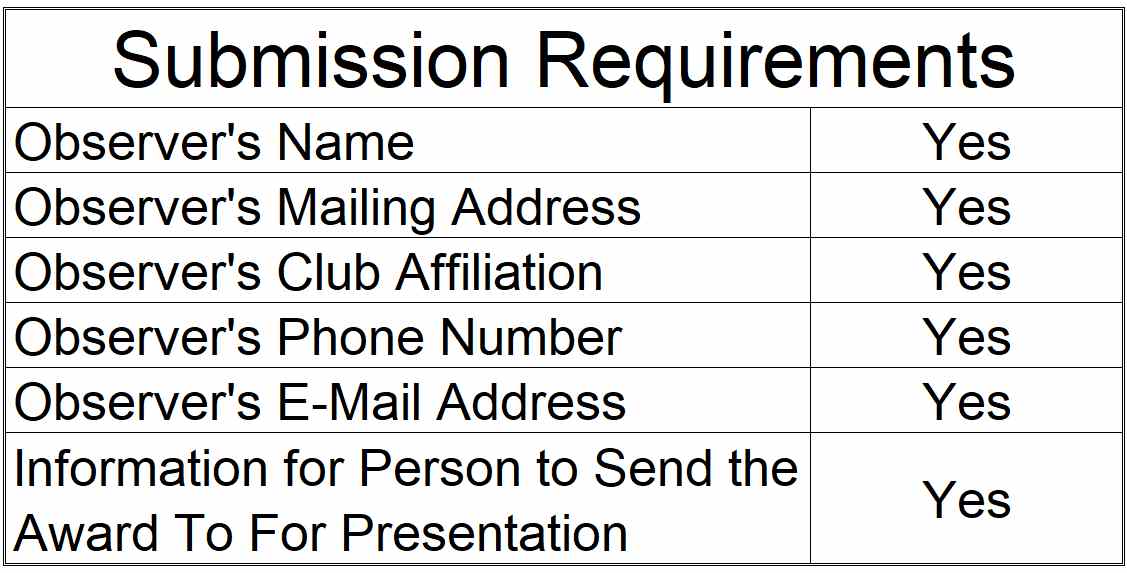Master Observer Award Coordinator:David Whalen |
 |
IntroductionThe Astronomical League currently sponsors over 65 Observing Programs for its members to participate in; more continue to be added each year. These Observing Programs and Awards help to give focus and direction to many observers. Ranging from beginning programs for the novice, to those which require a major effort from an observer long committed to the hobby — from unaided eye observing to projects requiring a large light bucket telescope — and from orbital satellites through the shallow sky of the solar system to the deep reaches of intergalactic space, these Observing Programs have caught the imagination and attention of hundreds of amateur observers. In fact I know a number of professional astronomers who continue to hone their observational skills by participating in the AL Observing Programs. |
 |
Many members move through one Observing Program after another (or, like me, they are working on several Observing Programs, simultaneously), constantly seeking new inspiration. Over the years, the quality of amateur observations has increased. Observers appreciate being rewarded at the completion of an Observing Program. Because of this, the League developed a Master Observer Award, which recognizes those whose interests are broad and whose skills are deep. The effort requires a breadth of observing knowledge while also permitting the observer to pursue special interests. What follows is a description of the work required to receive the Master Observer Award.
When you earn this certification, you have earned the title of Master Observer.
Requirements and Rules
This certification is available to members of the Astronomical League, either through their local astronomical society or as members at large. If you are not a member and would like to become one, check with your local astronomical society, search for a local society on the Astronomical League Website (click here), or join as a member at large (click here).
- Messier Observing Program (Honorary)
- Binocular Messier Observing Program
- Lunar Observing Program
- Double Star Observing Program
- Herschel 400 Observing Program
These are currently five of the most popular programs in the League and represent a well-rounded observing program. The member will then be allowed to choose any five of the remaining AL Observing Programs to complete the requirements for the Master Observer Award.
Specific Situations:
- Please note that only the most advanced award for any program is acceptable for a Master Observer Award if there are levels in an Observing Program, e.g., the Gold Certificate only for the Messier Observing Program, the 36-hour certificate for the Meteor Observing Program, etc.
- The Outreach Awards may not be used for the Master Observer Award.
- The Dark Sky Advocate Observing Award and the Special Observing Awards (Planetary Transit, Eclipse, NASA Challenges, etc.) cannot be used for the Master Observer Award.
- The awards that are part of the Master Observer Progression (Observer, Binocular Master Observer, etc.) cannot be used for the Master Observer Award.
- Either level for the Bennett Observing Program is acceptable. However only one will be counted, and you may not use both the Bennett Observing Program and the Messier Observing Program as part of the Master Observer Award.
- Note also that the Caldwell Observing Program has both Gold (all 109 objects) and Silver (70 objects) Certificates. In this case, each is treated as a separate Observing Program; however, an observer is only allowed to include one or the other among the five optional programs for the Master Observer Award.
Once a member has completed ten of the Observing Programs, she or he will be awarded a certificate and pin. The League has decided to present Master Observers with a plaque when they attend the Astronomical League Convention.
Submitting for Certification
The member should contact the Coordinator of the Master Observer Awards with information that includes:
|
 |
Upon verification of your submission and of your active membership in the Astronomical League, your recognition (certificate, pin, etc.) will be sent to you or to the awards coordinator for your society, as you specified. Your name will also appear in an upcoming issue of the Reflector magazine and in the Astronomical League’s online database. Congratulations. Good luck with your next observing challenge.
Notes:
Acknowledgements: I would like to thank John “Sparky” Sparks, a long-time friend and fellow observer from the Knoxville (TN) Observers, who presented the idea of an award for those who had mastered a wide variety of observational skills to John Wagoner in Plano, TX, who at that time coordinated the awards for which I am now responsible. Wagoner then did the initial legwork and I added the finishing touches after he found it necessary to relinquish custody of the award. Warren Kirbo, another friend and observing partner, who was also an artist as well as a master observer in his own right, designed the pin and logo. He was from Camilla, GA and passed away in Nashville, TN a few years ago. – Mike Benson
I would like to add an additional name to the list of people who have played a major role in the development of this Observing Award and have brought it to the level of participation that it is at today. I have the honor to follow in the footsteps of Mike Benson. Mike has decided that it is time to pass the baton. Thank you Mike for all you have done for this Observing Award and the Astronomical League. I will do my best to continue the tradition. – Aaron Clevenson
Master Observer Award Coordinator:David Whalen |
 |



